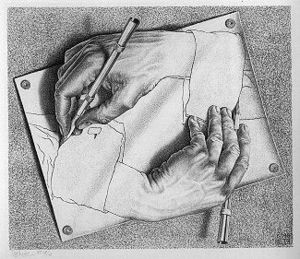Life imitates art. We shape our tools and thereafter they shape us.
— John M. Culkin, “A Schoolman’s Guide to Marshall McLuhan” (Saturday Review, 1967)
Every time we introduce a new tool, it always leads to new and unexpected discoveries, because Nature’s imagination is richer than ours.
— Freeman Dyson, ‘The Scientist as Rebel’, in Cornwell (ed.), Nature’s Imagination
The process of natural design, it seems, will routinely outrun the imaginings of human theorists.
— Andy Clark (1997, 97)
